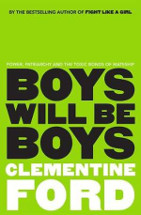Boys will be boys - Power, patriarchy and the toxic bonds of mateship by Clementine Ford

Allen and Unwin 2018. ISBN: 9781760632335.
(Age: Adults - senior secondary) Described on the book jacket as
'Fearless feminist heroine' Clementine Ford has followed up her
tirade about sexism Fight Like a Girl with an examination of
toxic masculinity. She reasons that as she is now the mother of a
boy she needs to ensure he grows up to be a supporter not a
perpetrator. The phenomenon in western culture of gender stereotypes
expressed from birth in blue for boys, pink for girls; active toys
for boys and domestic ones for girls is a 'manifestation of
capitalist ideals'. The reader is assured that if they conform 'you
are not a bad person but you are doing a bad thing' p15. Ford's
language is provocative and strident, she makes sweeping statements
and her assertions tend to be repetitive but the book is full of
examples, case studies and statistics which have the added relevance
of being from an Australian, and often South Australian perspective.
'Boys are defined by how impressive they are while girls are defined
by how impressive they look', 'my job is to disrupt that dynamic,
not facilitate it' p24. The following chapters look at sharing of
domestic chores and child rearing; the imbalance of roles in movies
for women 'include a girl but make sure she won't be the main one'
p80; the insistence that not all men are perpetrators diluting the
debate about violence towards women; the double standards applied to
multiple sexual relationships for boys and girls; the phenomenon of
internet trolling and the torrent of abuse from the Men's Rights
Movement. She looks at the way the legal system takes gender into
account and in a chapter on the lack of women in leadership roles
she has a delicious quote from Tony Abbott about it being folly to
expect women to dominate or even approach equal representation p230.
There are worrying chapters on rape jokes and sentencing in rape
cases ending with twenty pages outlining cases of men who have been
accused or convicted of various crimes against women. The epilogue
is a sensitive and tentatively positive letter to her son and I
would have liked to have more positive suggestions and examples
throughout the book. I don't think, as the book jacket claims, this
book will answer the question 'how do I raise my son to respect
women and give them equal space in the world' but it will raise
awareness of the multiple ways we might fail. Suitable for adults
and senior students, details about rape and violence towards women
make it unsuitable for younger readers.
Sue Speck